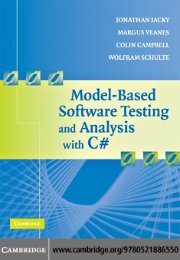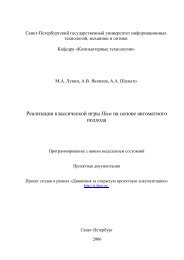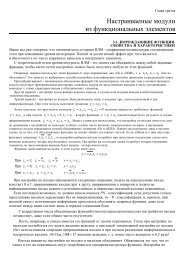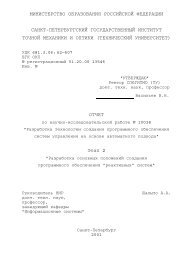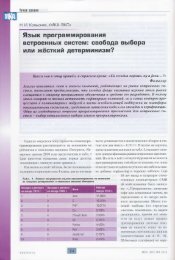- Page 2:
This page intentionally left blank
- Page 6:
more free ebooks download links at:
- Page 10:
CAMBRIDGE UNIVERSITY PRESS Cambridg
- Page 14:
vi Contents 2.7 Some simple scenari
- Page 18:
viii Contents 8.5 Limitations of of
- Page 22:
x Contents V Appendices A Modeling
- Page 26:
xii Preface specification, or appli
- Page 30:
xiv Preface one of the main purpose
- Page 34:
xvi Acknowledgments as evolving alg
- Page 38:
more free ebooks download links at:
- Page 42:
4 Describe, Analyze, Test We also t
- Page 46:
6 Describe, Analyze, Test do behave
- Page 50:
8 Describe, Analyze, Test To use ct
- Page 54:
10 Describe, Analyze, Test Concept
- Page 58:
12 Describe, Analyze, Test testing
- Page 62:
14 Why We Need Model-Based Testing
- Page 66:
16 Why We Need Model-Based Testing
- Page 70:
18 Why We Need Model-Based Testing
- Page 74:
20 Why We Need Model-Based Testing
- Page 78:
22 Why We Need Model-Based Testing
- Page 82:
24 Why We Need Model-Based Testing
- Page 86:
26 Why We Need Model-Based Testing
- Page 90:
28 Why We Need Model-Based Testing
- Page 94:
30 Why We Need Model-Based Testing
- Page 98:
32 3 Why We Need Model-Based Analys
- Page 102:
34 Why We Need Model-Based Analysis
- Page 106:
36 Why We Need Model-Based Analysis
- Page 110:
38 Why We Need Model-Based Analysis
- Page 114:
40 Why We Need Model-Based Analysis
- Page 118:
42 Why We Need Model-Based Analysis
- Page 122:
44 Why We Need Model-Based Analysis
- Page 126:
46 Why We Need Model-Based Analysis
- Page 130:
48 Why We Need Model-Based Analysis
- Page 134:
50 Why We Need Model-Based Analysis
- Page 138:
52 Why We Need Model-Based Analysis
- Page 142:
54 Further Reading The standard ref
- Page 146:
more free ebooks download links at:
- Page 150:
58 Model Programs system comprising
- Page 154:
60 Model Programs Figure 5.2. Newsr
- Page 158:
62 Model Programs reasonable work a
- Page 162:
64 Model Programs 5.3.6 Select the
- Page 166:
66 Model Programs } } static bool S
- Page 170:
68 Model Programs Parameters and lo
- Page 174:
70 Model Programs [Test] [Category(
- Page 178:
72 Model Programs that the sequence
- Page 182:
74 Model Programs ServerSend(212.0)
- Page 186:
76 Model Programs using NModel; usi
- Page 190:
78 Model Programs // ... continued
- Page 194:
80 Model Programs } } // ... contin
- Page 198:
82 Model Programs the set of argume
- Page 202:
84 Model Programs Timeout(); Poll()
- Page 206:
86 Model Programs using System; //
- Page 210:
88 Model Programs // ... Reactive s
- Page 214:
90 Model Programs // ... Reactive s
- Page 218:
92 Model Programs } } // ... Reacti
- Page 222:
94 6 Exploring and Analyzing Finite
- Page 226:
96 Exploring and Analyzing Finite M
- Page 230:
98 Exploring and Analyzing Finite M
- Page 234:
100 Exploring and Analyzing Finite
- Page 238:
102 Exploring and Analyzing Finite
- Page 242:
104 Exploring and Analyzing Finite
- Page 246:
106 Exploring and Analyzing Finite
- Page 250:
108 Exploring and Analyzing Finite
- Page 254:
110 Exploring and Analyzing Finite
- Page 258:
112 Exploring and Analyzing Finite
- Page 262:
114 Exploring and Analyzing Finite
- Page 266:
116 Structuring Model Programs with
- Page 270:
118 Structuring Model Programs with
- Page 274:
120 Structuring Model Programs with
- Page 278:
122 Structuring Model Programs with
- Page 282:
124 Structuring Model Programs with
- Page 286:
126 Structuring Model Programs with
- Page 290:
128 Structuring Model Programs with
- Page 294:
130 Structuring Model Programs with
- Page 298:
132 Structuring Model Programs with
- Page 302:
134 Structuring Model Programs with
- Page 306:
136 Structuring Model Programs with
- Page 310:
138 Testing Closed Systems Instead
- Page 314:
140 Testing Closed Systems 0 1 2 3
- Page 318:
142 Testing Closed Systems the mode
- Page 322:
144 Testing Closed Systems } } } }
- Page 326:
146 Testing Closed Systems Compile
- Page 330:
148 Testing Closed Systems B() A()
- Page 334:
150 9 Further Reading There are man
- Page 338:
more free ebooks download links at:
- Page 342:
more free ebooks download links at:
- Page 346:
156 Modeling Systems with Structure
- Page 350:
158 Modeling Systems with Structure
- Page 354:
160 Modeling Systems with Structure
- Page 358:
162 Modeling Systems with Structure
- Page 362:
164 Modeling Systems with Structure
- Page 366:
166 Modeling Systems with Structure
- Page 370:
168 Modeling Systems with Structure
- Page 374:
170 Modeling Systems with Structure
- Page 378:
172 Modeling Systems with Structure
- Page 382:
174 Modeling Systems with Structure
- Page 386:
176 Modeling Systems with Structure
- Page 390:
178 Modeling Systems with Structure
- Page 394:
180 Modeling Systems with Structure
- Page 398:
182 Modeling Systems with Structure
- Page 402:
184 Analyzing Systems with Complex
- Page 406:
186 Analyzing Systems with Complex
- Page 410:
188 Analyzing Systems with Complex
- Page 414:
190 Analyzing Systems with Complex
- Page 418:
192 Testing Systems with Complex St
- Page 422:
194 Testing Systems with Complex St
- Page 426:
196 Testing Systems with Complex St
- Page 430:
198 Testing Systems with Complex St
- Page 434:
200 Testing Systems with Complex St
- Page 438:
202 Testing Systems with Complex St
- Page 442:
204 Testing Systems with Complex St
- Page 446:
206 Testing Systems with Complex St
- Page 450:
208 Testing Systems with Complex St
- Page 454:
210 Testing Systems with Complex St
- Page 458:
212 Testing Systems with Complex St
- Page 462:
214 Testing Systems with Complex St
- Page 466:
216 Testing Systems with Complex St
- Page 470:
218 Testing Systems with Complex St
- Page 474:
220 Further Reading (Beizer, 1995).
- Page 478:
more free ebooks download links at:
- Page 482:
224 Compositional Modeling 1. First
- Page 486:
226 Compositional Modeling a lot of
- Page 490:
228 Compositional Modeling terms) t
- Page 494:
230 Compositional Modeling FSM(0, A
- Page 498:
232 Compositional Modeling and it i
- Page 502:
234 Compositional Modeling FSM(0, A
- Page 506:
236 Compositional Modeling namespac
- Page 510:
238 Compositional Modeling 14.2.6 C
- Page 514:
5 ReqWork(2, 2) 3 0 1 6 7 ReqSetup(
- Page 518:
242 Compositional Modeling placehol
- Page 522:
244 Compositional Modeling It is cl
- Page 526:
246 Compositional Modeling For para
- Page 530:
248 Modeling Objects static class C
- Page 534:
250 Modeling Objects namespace Payr
- Page 538:
252 Modeling Objects } } void SetSa
- Page 542:
254 Modeling Objects 0 CreateEmploy
- Page 546:
256 Modeling Objects The most impor
- Page 550:
258 Modeling Objects What effect wi
- Page 554:
260 Reactive Systems what part of i
- Page 558:
262 Reactive Systems namespace BagM
- Page 562:
264 Reactive Systems 16.3 Asynchron
- Page 566:
266 Reactive Systems namespace SPIm
- Page 570:
268 Reactive Systems refers to the
- Page 574:
270 Reactive Systems tester actions
- Page 578:
272 Reactive Systems 16.5.3 Passive
- Page 582:
274 Reactive Systems The stepper co
- Page 586:
276 Further Reading An approach of
- Page 590: more free ebooks download links at:
- Page 594: more free ebooks download links at:
- Page 598: 282 Modeling Library Reference name
- Page 602: 284 Modeling Library Reference and
- Page 606: 286 Modeling Library Reference “D
- Page 610: 288 Modeling Library Reference [Act
- Page 614: 290 Modeling Library Reference If t
- Page 618: 292 Modeling Library Reference Requ
- Page 622: 294 Modeling Library Reference Synt
- Page 626: 296 Modeling Library Reference IsEm
- Page 630: 298 Modeling Library Reference Remo
- Page 634: 300 Modeling Library Reference Last
- Page 638: 302 Modeling Library Reference Coun
- Page 644: Appendices 305 Second The second va
- Page 648: Appendices 307 The Action data type
- Page 652: Appendices 309 B.1.3 Options /?, /h
- Page 656: Appendices 311 B.2 Offline test gen
- Page 660: Appendices 313 accepting state is r
- Page 664: C Glossary Undefined terms The foll
- Page 668: Appendices 317 assurance method. A
- Page 672: Appendices 319 decrementing action
- Page 676: Appendices 321 finitize. To write a
- Page 680: Appendices 323 IUT. Implementation
- Page 684: Appendices 325 oracle. The authorit
- Page 688: Appendices 327 sandbox. Atest harne
- Page 692:
Appendices 329 stopping rule. A rul
- Page 696:
Appendices 331 wait action.Anintern
- Page 700:
Bibliography J.-R. Abrial. The B Bo
- Page 704:
Bibliography 335 E. M. Clarke, O. G
- Page 708:
Bibliography 337 D. Lee and M. Yann
- Page 712:
Bibliography 339 J. Woodcock and M.
- Page 716:
Index a priori testing. See offline
- Page 720:
Index 343 Common Language Infrastru
- Page 724:
Index 345 IOCO theory, 277 isomorph
- Page 728:
Index 347 safety requirement, 34, 1
- Page 732:
Index 349 unshared action, 123-124,





